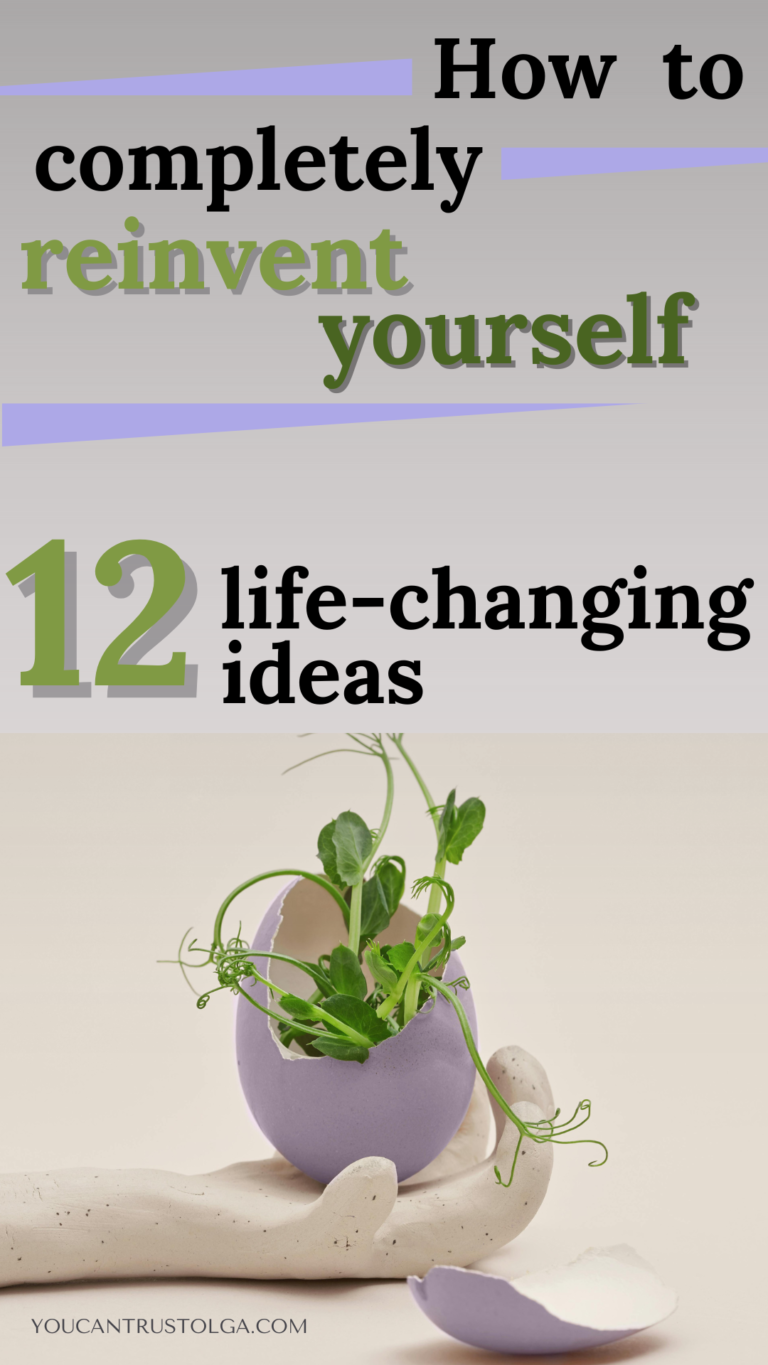As humans, we naturally strive to reach our full potential and become the best versions of ourselves. This inner drive pushes us to continuously learn, grow, and adapt. Our goal is not just to live but to thrive in every part of our lives.
In this blog post, you will discover quality ideas on how to reinvent yourself, embrace change, and unlock your full potential. Let’s go!

The topic of personal development is vast indeed and can cover a wide range of areas. We can focus on physical health through exercise and a good diet, or delve into career or financial aims.
As a future therapist, I’ve chosen to concentrate on mental and emotional wellness. To me, if you truly want to evolve and become a better you, that’s where you should begin.
With that said, it’s crucial to realize that finding yourself is AN ONGOING JOURNEY. It involves reflecting on yourself, looking inward, and being open to change.
The aim is not just to reinvent yourself once but to continue reinventing time and time again.
The checklist to reinventing yourself
I’m not sure about you, but to me, life just clicks when there’s a steady stream of growth and change happening. I pat myself on the back every time I notice a positive shift in how I think, act, or approach things.
Witnessing personal progress, like becoming more patient or handling tough situations with grace, is truly empowering.
Now you might wonder, What are the changes that I can make to become a better version of myself?
The answer is not as simple, and it varies from person to person. However, there are universally beneficial practices that can positively influence the life of pretty much any person.
So, what are they?
1. Get out of your comfort zone as often as you can
Comfort zones are comfy indeed, but they are also “dead zones” – there is no life happening there. Staying in your comfort zone means staying stagnant and not striving for growth.
Stepping out of it, on the other hand, allows you to expand your horizons, try new things, and discover new passions. It can be scary at first, but once you start doing it, you instantly feel that LIFE IS FINALLY HAPPENING TO YOU.
Yes, fear of the unknown that comes from experiencing new things in life often comes with a lot of anxiety. But can we bear SOME anxiety in order to tap into the endless possibilities that life has to offer?
At the end of the day, you don’t have to see the concept of “comfort zone” as a challenge. Take a different look at it. Think of it as an adventure, as an opportunity to bring yourself to living to your fullest.
2. Allow yourself to feel
There are two types of emotions – PRIMARY and SECONDARY. Primary emotions are the ones that we feel initially, such as happiness or anger. Secondary emotions are the reactions to our primary emotions, such as guilt or shame. The latter are very harmful and they are usually the root of all emotional problems people usually bring to the therapy.
Often when you feel uneasy and something’s bothering you without knowing why, it might be because you’re being hard on yourself for feeling a certain way.
The absolute worst thing we can do to ourselves is to be upset for feeling a certain way. It’s important to allow yourself to FULLY EXPERIENCE AND PROCESS YOUR PRIMARY EMOTIONS WITHOUT JUDGMENT.
As much as the world advocates for happiness and positivity, it’s also crucial to remember that negative emotions have rights too. Anger, jealousy, and envy are EQUALLY as important as joy, elation, and contentment.
Life encompasses the whole spectrum of feelings and emotions. They are a huge part of our human experience. Thus, each emotion deserves to be acknowledged and heard.
So next time you’re feeling down or upset, know that it’s a VALID emotion and allow yourself the space to process it without any distractions or judgments. Just feel what you feel and let it run its course.
3. Invite change into your life
As we get too absorbed in our daily routines, strong emotions of excitement and thrill slowly disappear from our lives. Little by little, we are getting used to stability and prefer it over anything unknown.
It is human nature that our brains prefer familiarity over change. There is nothing wrong with that except for the fact that CHANGE IS AN INEVITABLE AND NECESSARY VARIABLE FOR GROWTH.
The danger of avoiding any change is that we soon become conditioned by petty things and then even small detours from established routines cause stress in us. Not only does our life turn dull, but we also start to experience anxiety for no apparent reason. It is a pathetic way to live.
That is why it is so important to introduce novelty in our lives as often as possible.
By experiencing new things, we open ourselves up to endless possibilities and opportunities. We not only break free from the mundane but also discover hidden talents and passions that we never knew existed.
Think about it, if everything in life stayed the same, would we ever learn or evolve? Would we have inventions and advancements in technology? Would we have the diverse cultures and communities that make our world so interesting?
The same is true for every individual organism – change is necessary for your personal expansion. It adds excitement and joy to your life and also make you a more well-rounded and open-minded individual.
Really, why be a simpleton and let the fear of the unknown hold you back from experiencing all that life has to offer?
4. Give up control
We often mistakenly think that we can have control over things, people, or events, but we are lying to ourselves. Usually, our control attempts manifest in excessive attention to detail, obsession with organization, micromanaging, or trials to change others.
Those are delusions that provide us with a false sense of security, and deep down we know we are deceiving ourselves.
But how else can we ensure our own safety in this unstable, ever-changing and uncertain world?
I am sorry to rub it in your face, but no one guaranteed us safety and we were given no promises to begin with. The world has never vowed to be fair, logical, or predictable, and yet we keep trying to make it so.
So if we don’t really have any power, should we continue to pretend like we do? Should we continue to hold onto this illusion of control, or is it time to let go and accept the chaotic nature of life?
It’s a tough question, and the answer may not be clear. But perhaps by acknowledging our lack of control, we can start to focus on what we do have power over – ourselves.
We can work on developing resilience, adaptability, and a positive mindset that allows us to navigate through the unpredictable twists and turns of life.
Instead of clinging to control over external factors, maybe we should shift our focus inward and work on being our best selves in any given situation. After all, isn’t that the only thing we truly have control over?
5. Invest efforts in developing self-compassion
One thing that you definitely want to see different in the reinvented version of yourself is less self-criticism and more self-compassion.
For many of us, the idea of self-compassion may still be misconstrued as a weakness, something incompatible with the pursuit of success. Contrary to this belief, understanding your own feelings and fostering a friendly attitude towards yourself is a source of great strength.
Self-compassion helps us to make friends with ourselves and to acquire this special person who is available 24/7 to provide us with the support and kindness that we need.
Self-compassion is about understanding your emotions, accepting your needs, and respecting your limitations. Self-compassion is a powerful way to take off your shoulders the burden of expectations and unrealistic ideas of perfectionism.
It grants you the freedom that comes from the realization that you are JUST AS HUMAN AS OTHERS – a normal person, who is not better or worse than anybody else.
To learn more about how to practice self-compassion check out my other article: Ultimate Guide to Self-Compassion (Including 50+ Affirmations).
"Self-Compassion" by K. Neff
Learn the basics of self-compassion from the pioneer who coined the term - Dr. Kristin Neff. With her expertise and guidance, you can learn how to cultivate self-compassion in your daily life. Whether you're struggling with difficult emotions or feeling overwhelmed by expectations, Dr. Neff's approach can help you find peace and understanding within yourself.
6. Let people around you be who they are
The intricate web of human relationships is surely impossible to confine to a timetable. If only our relatives, spouses, and friends could do what we want them to do, exactly when we want them to do it. But instead, they wear us down with their quirks, differences of opinion, and unpredictability.
Annoying, right? But when we expect people to be a certain way, we set ourselves up for disappointment. We know that too.
Humans are complex creatures and everyone’s act is coming from their own internal guidance system. Motivations of human actions are generally much more elaborate than we tend to think they are. So even if we think we know another person well, we still can be surprised by their actions and reactions.
The best way to navigate relationships is to accept people for who they are, without trying to change them or fit them into our own expectations. This doesn’t mean that we should allow people to treat us poorly or disrespectfully, but rather that we should acknowledge and respect their individuality.
If you embrace unpredictability, you can approach personal interactions with an open mind and avoid feeling let down when someone doesn’t act as you anticipated.
In other words, you want to allow people to be exactly who they are. You might be surprised to see how they are going to show up for you.
7. Stop comparing yourself
Since in our day and age, we are being socially sanctioned to be “special or at least above average”, we spend tons of mental energy on comparing ourselves with others.
When we find that someone is doing better than we do, we feel threatened and upset. We then make it the goal of our life to compete and surpass others.
The funny thing is, although we do all that to become socially acceptable, likable, and accepted we actually distance ourselves more than ever from others as we do that.
If you are serious about reinventing yourself, start letting go of the constant need to compare yourself with others. It is exhausting, self-defeating, and absolutely useless.
Embrace who you are and focus on IMPROVING yourself rather than competing with others. Stop looking at endless Instagram stories, because you will never win this battle.
There is always going to be someone smarter, more beautiful, or more successful. It will only distort your reality and bring confusion into your absolutely normal human life.
8. move more
Although physical movements might be associated mostly with ideal body image, it is also crucial for your mental well-being. Exercising is a natural and most effective way to improve your mood and make you feel good.
I am not talking about getting serious with it, like hitting the gym five times a week, but simply moving more on a daily basis. This can include walking more instead of driving, taking the stairs instead of the elevator, or doing some jumping jacks during work breaks.
These simple movements can not only change your mood but also affect your decision-making.
Also, small but consistent physical activity habits over time tend to have a cumulative effect, leading to improved physical appearance. It’s a pleasant bonus, don’t you think?
If the idea of physical activity is absolutely unbearable to you, see if you like somatic workouts. Those are the easiest forms of exercise out there, yet super effective and powerful, especially for your mental health.
9. Let go of perfectionism
Our minds like to sell us the idea that WE SHOULD BE DIFFERENT FROM WHAT WE ARE. Most of our internal conflicts arise from the discrepancy that exists between who we are and who we think we should be.
We don’t like the idea of having flaws, and we spend a lot of time and energy compulsively chasing perfection. Let’s admit that we like being called perfectionists, we give it a positive connotation, and our ego is flattered to receive such recognition.
Yes, the world is full of perfectionism enthusiasts, and setting high standards is widely praised and encouraged. But the world is also full of neurotics and unhappy people, who struggle to have a normal night’s sleep, are stuck in overthinking cycles, and have no peace of mind whatsoever.
Overcoming perfectionism is a part of self-discovery on the journey of reinventing yourself. Adopting the mentality of IMPROVEMENT rather than perfection can bring a sense of freedom and relief. It allows us to accept ourselves for who we are and acknowledge that we have potential.
When we choose improvement over perfectionism it indicates that we are mature and sensible. Meaning we don’t live in a fantasy, striving to become a better version of ourselves, yet respecting our limitations.
10. do not fast forward the life
If you take time to observe the steam of your thoughts you’ll notice that most of the time you live in the future. Our brains are in constant move – planning, prepping, rehearsing, replaying – rushing through the moment and absolutely disregarding the present moment.
There is an old saying on that occasion, “Today is yesterday’s tomorrow”, meaning that the future we constantly plan never arrives, and the present moment becomes our past in an instant.
It is almost like the present moment is never enough for us, and we keep fast-forwarding life to somewhere we will never be. It is a scary realization.
Really, where are we heading to? Death bed? Retirement? Happiness that we never actually experience because we are always waiting for it in the future?
What if we slowed down and learned to appreciate the present moment, no matter how mundane or difficult it may seem? What if we allowed ourselves to fully experience each moment as it happens, without constantly thinking about the next one?
Slowing down is counterintuitive to us, especially in a fast-paced modern world. It requires a degree of awareness that can be practiced and learned through mindfulness activities like “Pausing”.
Pausing is simply taking a moment to stop and be fully present in the moment. It can be as simple as taking a deep breath, observing your surroundings, or even just closing your eyes for a few seconds.
By incorporating pausing into our daily lives, we can break away from the constant rush and worry about the future. We can learn to appreciate the small moments that make up our lives and find happiness in them.
Finally, we can slow down and experience our own life instead of just rushing through it.
11. bask yourself in gratitude
Everyone keeps talking about being appreciative of life and practicing gratitude daily. But it is easier said than done.
There is a difference between having an understanding of something and actually experiencing it. Gratitude is not just a concept, it is an emotion that we must actively cultivate.
Because honestly, you can talk all you want about being grateful, but until you actually feel it in your heart and soul, it’s just words.
So you need to feel your way into gratitude by consistently basking yourself into it – the more you do it, the more natural it will become to you.
Try to take a moment each day to reflect on the things you are grateful for. It can be as simple as appreciating your health, and your loved ones, or even something as small as having a warm cup of coffee in the morning.
The key is to really feel that sense of gratitude and let it sink in. Don’t just rush through this exercise like another task on your to-do list. Take the time to truly appreciate and savor these moments of gratitude.
And when you start experiencing gratitude regularly, you will begin to notice a shift in your mindset. You will find yourself being more positive and optimistic, even during challenging times.
12. Talk less, listen more
One of the things that really gets to me on a personal level is when people just talk too much.
You know, when someone goes on and on about themselves, trying to impress by sharing every detail about their life, their achievements, how amazing they are – it can really rub the wrong way.
This kind of oversharing tends to overwhelm the listener and make them lose interest pretty quickly.
It brings to mind a quote from Theodore Roosevelt that I find particularly relevant: “People don’t care how much you know until they know how much you care.”
This quote really emphasizes the importance of genuine care and interest in others, rather than just focusing on self-promotion. You always have much better change to become accepted and likable when you show interest in another person rather than chit chatting about beloved self.
One of the most powerful gifts you can give someone is your undivided attention. Instead of monopolizing the conversation with stories about yourself, shift the spotlight onto the other person.
Listen with genuine interest and curiosity. Be fully present, and don’t spend your time thinking about what to say next. Submerge yourself in their world, ask questions, and show that you care about their thoughts and feelings.
It’s all about building connections and showing that you genuinely care about others before trying to show off how much you know.





